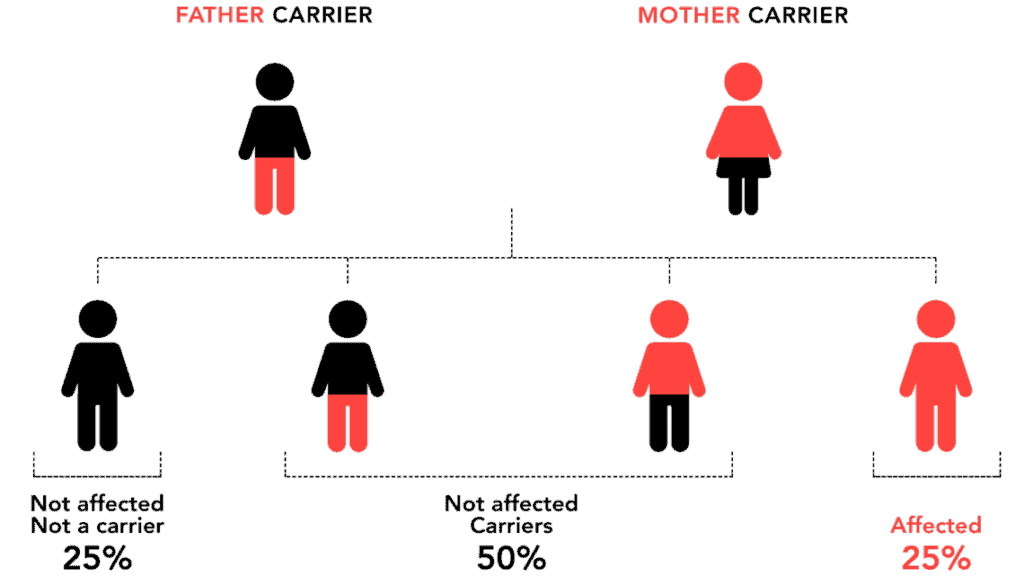
GCT: Genetic Compatibility Test to avoid passing hereditary diseases
Our Genetic Compatibility Test (GCT) based on next-generation DNA sequencing analyzes more than 600 or 3000 disorders.
For a person with an hereditary disease, eliminating the chance of passing that disease on to their children becomes a desire as well as the very best gift they could give them. Sometimes, parents don’t even know they are carriers of a disease. A person with an hereditary disease will pass it on to his or her children. Sufferers carry a heavy weight upon their shoulders because they are aware that they will pass on health issues to their children and that this will have a negative impact on their quality of life or lead to premature death. In most cases, we are carriers of one recessive disease or another, but our health is not affected by it. However, there is the possibility that we might pass that disease on to our children.
As a result of the research in genetics carried out by the Instituto Bernabeu laboratory, we can currently detect more than 600 genetic diseases or more than 3,000 – depending on the modality – thanks to the Genetic Compatibility Test (GCT) also known as Preconceptional Screening of Recessive Diseases. It is based on the scientific technology of massive DNA sequencing or Next Generation sequencing (NGS). This analysis, which is carried out on the couple, is used to detect mutations in the genes responsible for recessive diseases and which are linked to the X chromosome. Based on this information, and should both partners have a mutation in the same gene, all means available are used in order to ensure that a future child does not inherit the disease.

Autosomal recessive diseases are hereditary and are found on the genetic map. They are rare since they are present in only 1% of newborns. However, when the diseases do occur, for the most part they cannot be cured and have a significant limiting impact.
If the same gene is abnormal in both partners, there is a 50% chance of their children not suffering from the disease. They will, however, be carriers of it. There is also a 25% chance of the child actually getting the disease, the same chance as the child being born free of it.
Only a blood sample is necessary to be able to analyze more than 600 or 3000 genetic diseases that are currently more prevalent, such as cystic fibrosis, different types of paralysis, also diabetes, muscular dytrophy, epilepsy or a recurring disease like deafness.
The role of the test in the case of donors
At Instituto Bernabeu, we consider the test to be of such great importance and we are so convinced that it is vital to be aware of any abnormality that may affect a future child, that we carry out this test as part of our standard protocol for all donors. This is true both for egg donors and for sperm donors and implies no additional cost for the parents who will receive the gamete. In order for the test to be efficient, both gamete providers need to be analysed in order to rule out abnormalities in the same gene.
When is PGD advisable?
The test is recommended for couples who wish to have a child, whether using natural means or with treatment, when one or both partners have a history of a disease in their family or when they are carries of a genetic disorder. It is also recommended for couples who are blood relatives and those who are due to undergo treatment using donor eggs or donor sperm.
When it is determined that a couple shares mutations in the same gene, it is possible to avoid passing the disease on to their children by using in vitro fertilisation treatment and later analysing the embryos in the laboratory. Pre-implantation Genetic Diagnsis (PGD) is carried out in these couples to ensure that only embryos that are free of the disease are transferred to the mother. An alternative option consists of opting for gamete donation involving the selection of gametes that are free of the same disease as the carrier.
Having the Genetic Compatibility Test means freeing your future children of an hereditary disease.
